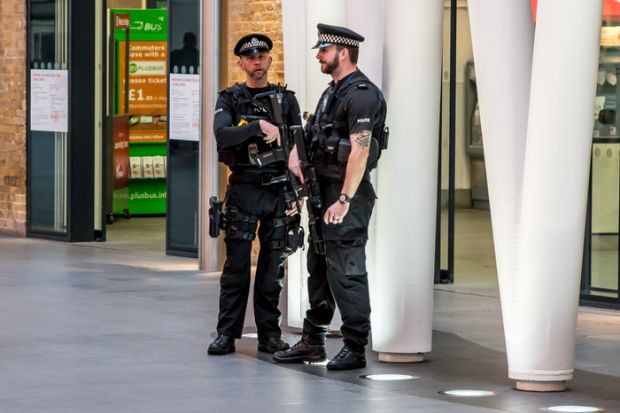The UK needs a new centre for the study of extremism to better understand radical ideologies because academia is not doing enough to analyse the problem, according to a conservative thinktank.
Policy Exchange says that one of the country’s counter-terrorism strategies, Prevent, has been undermined and delegitimised by organised campaigns – including on university campuses – something that former prime minister David Cameron says is “in essence, enabling terrorism.”
To combat this ‘disinformation’, the group has called for the creation of a new centre and rebuttal unit within the Home Office “dedicated to the research and diagnosis of Islamist and other forms of extremism”.
It would be particularly important for ministers “in an era where so much academic research, even that conducted at long-established universities, is dedicated not to analysing problems such as Islamist extremism, but critiquing government responses to it,” the thinktank’s report on the future of Prevent – a programme that is currently being reviewed by government – says.
The centre would be distinct from the existing Research, Information and Communications Unit (Ricu) by having a broader focus including looking at non-violent extremism and being more public-facing by publishing regular reports on the status and influence of various organisations.
Prevent has been criticised by some in higher education since it was expanded to include the sector in 2015, with critics claiming it has reinforced negative views of Islam, marginalised groups of Muslim students and stifled free speech on campus.
The strategy aims to stop people becoming terrorists or supporting terrorist activity and places responsibility on organisations such as universities to challenge and report any unusual behaviour that could be a sign of radicalisation.
Policy Exchange’s report states that “university campuses have been a key arena in which anti-Prevent activism has been particularly vocal”, citing the ‘students not suspects’ campaign, which aimed to abolish Prevent and was run by groups including the Federation of Student Islamic Societies and the National Union of Students but has been mostly dormant in recent years.
In 2015, 14 students’ unions also passed motions pledging “non-compliance” or “non-engagement” with Prevent, citing concerns about Islamophobia. Some of these have now lapsed but up to 10 remain in place, according to the thinktank.
These types of campaigns have created a narrative around Prevent so it is seen as disproportionate, unfair and a vehicle for the government to spy on individuals, according to Policy Exchange, but its report says these claims often do not stand up to scrutiny.
Mr Cameron, who oversaw the expansion of Prevent while in office between 2010 and 2016, says that those who refuse to “challenge falsehoods” surrounding the strategy are “guilty of a form of passive tolerance, whereby society fails to interfere in minority communities for fear of appearing racist”.
“So just as we need to counter the Islamist extremist narrative, we need to counter the anti-Prevent narrative. We need to show that delegitimising counterterrorism is, in essence, enabling terrorism,” he writes in the foreword to the new report.
Register to continue
Why register?
- Registration is free and only takes a moment
- Once registered, you can read 3 articles a month
- Sign up for our newsletter
Subscribe
Or subscribe for unlimited access to:
- Unlimited access to news, views, insights & reviews
- Digital editions
- Digital access to THE’s university and college rankings analysis
Already registered or a current subscriber? Login








